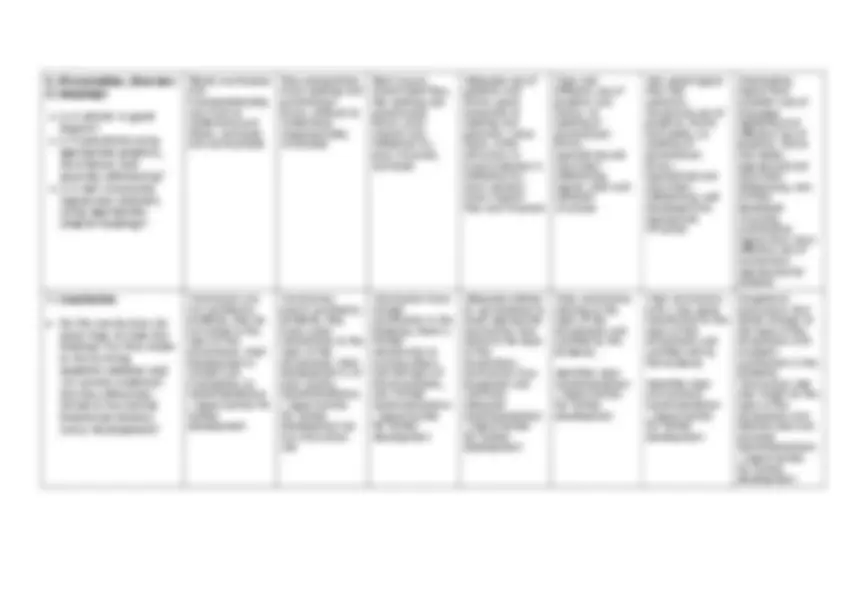



Study with the several resources on Docsity

Earn points by helping other students or get them with a premium plan


Prepare for your exams
Study with the several resources on Docsity

Earn points to download
Earn points by helping other students or get them with a premium plan
Community
Ask the community for help and clear up your study doubts
Discover the best universities in your country according to Docsity users
Free resources
Download our free guides on studying techniques, anxiety management strategies, and thesis advice from Docsity tutors
Identifies clear recommendation. / opportunities for further development. Clear conclusions with a very good relationship to the topic of the dissertation and.
Typology: Summaries
1 / 3

This page cannot be seen from the preview
Don't miss anything!


Not stated, confusing, unrelated to title, difficult to understand, inappropriate study
Very limited lacks effective focus and clear rational Too ambitious or too basic
Poorly defined and presented, some confusion in rationale
Clearly stated, some relevance, straightforward
Well stated purpose, appropriate and realistic explanation of the context /problem/case
Very clearly stated, feasible, innovative
Exceptionally well stated, interesting, sophisticated, original, full and convincing justification
Inadequate and/or irrelevant evidence, virtually no evidence of appropriate selection, no discussion of selection criteria, unsystematic or omitted referencing
Rudimentary coverage, very limited evidence of understanding
Lacks structure with clear gaps, no discussion of selection criteria, unsystematic referencing. Limited evidence of understanding and evaluation of the selected literature.
A basic coverage of relevant literature. Inconsistent referencing, The literature offers some additional understanding the problem/ project / development of project /case study
Good coverage, awareness of relevant prior research, clear structure, stated selection criteria, consistent referencing, clarity of understanding, the literature, informs and adds to the development of the project /case study
Comprehensive and inclusive use of highly relevant literature, good structure, clearly articulated discussion that relates to the topic of research
Exceptional section that fully demonstrates a discerning, creative and critical engagement with what has been read
No theoretical basis, no discussion or justification of approach, highly inadequate, no evidence of critical evaluation of sources and data
Irrelevant, very limited explanation of approach to the study
Irrelevant theoretical basis, poorly explained approach
Some evidence of a theoretical basis, reasonably explained.
Clear and relevant theoretical basis, appropriate approach, useful and appropriate information. An awareness of strengths and weaknesses of approach.
Very clear and relevant theoretical basis, persuasive rational for research approach, or methods used for the development of a project/ case study, evidence of critical evaluation
Provides excellent theoretical understanding rigorously argued approach, exceptional understanding evident
None, totally inappropriate and unrelated
Extremely limited collection of data, poorly identified data, no criteria for evaluation, no analysis
Casual acquisition of data, lacks structure, limited evaluation against unclear or inappropriate criteria, mostly descriptive
Standard approach to collection, limited validity, limited and basic, but acceptable evaluation or techniques
Standard approach to collection, clear validity and reliability, critical analysis using appropriate techniques and appropriate criteria
Advanced approaches of collection, clear validity, critical analysis using appropriate techniques and appropriate criteria, fully justified
Outstanding analytical techniques and approaches, evidence of creation of new approaches (if appropriate), thorough and rigorous analysis, exceptionally well justified
No attempt to relate findings to theory
Findings are not effective, discussion shows no learning from the evidence presented
Discussion shows a very limited awareness of theory and attempt to link this to the findings. There is a very limited discussion of the implications, and limitations of the research or development
Adequate level of critical analysis and reflection on personal learning. Adequate discussion of implications of the findings and reflection on the strengths and weaknesses of the research or development
Some links with theory, discussion justified with appropriate evidence, good critical analysis of the implications of the findings, and reflection on the strengths and weaknesses of the research or development
Comprehensive links with theory, complete justification with appropriate evidence, very good critical analysis of the implications of the findings, and reflection on the strengths and weaknesses of the research or development
Sophisticated and critical discussion of the issues involved, outstanding reflection on the strengths and weaknesses of the research, offers fresh/new insights on the problem or development